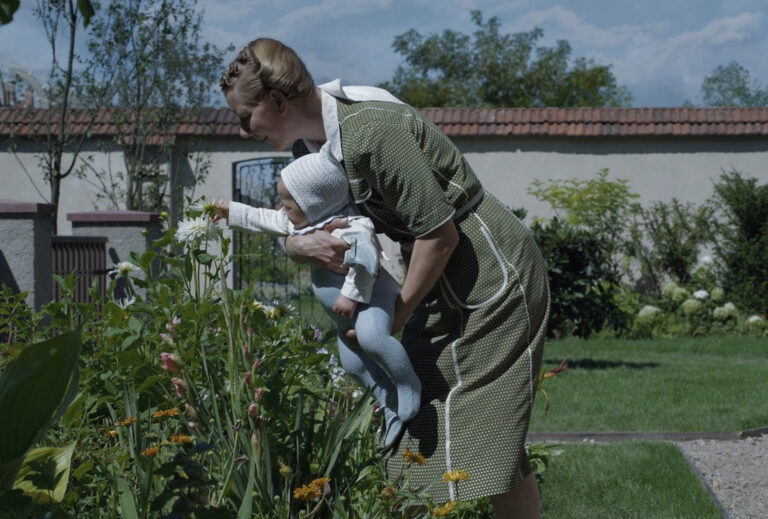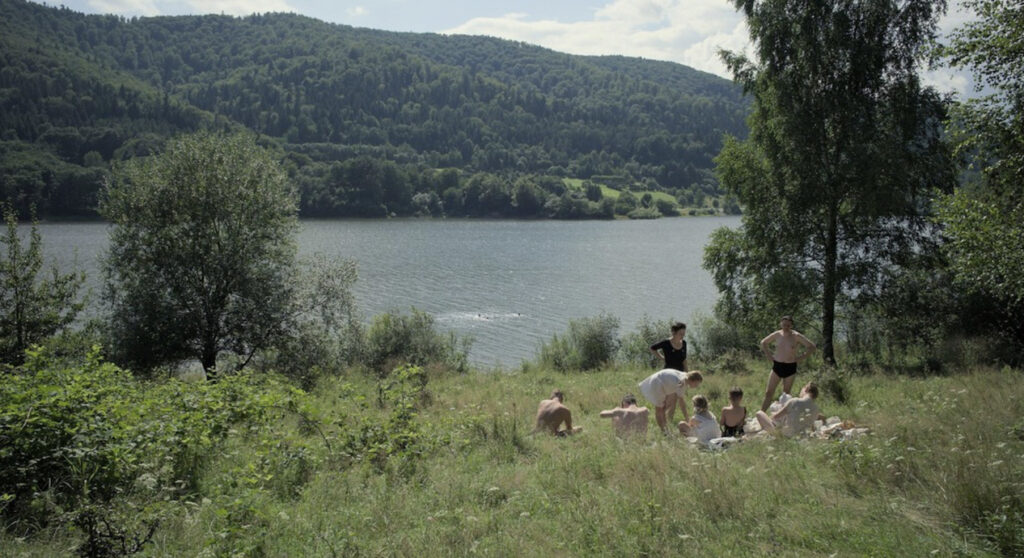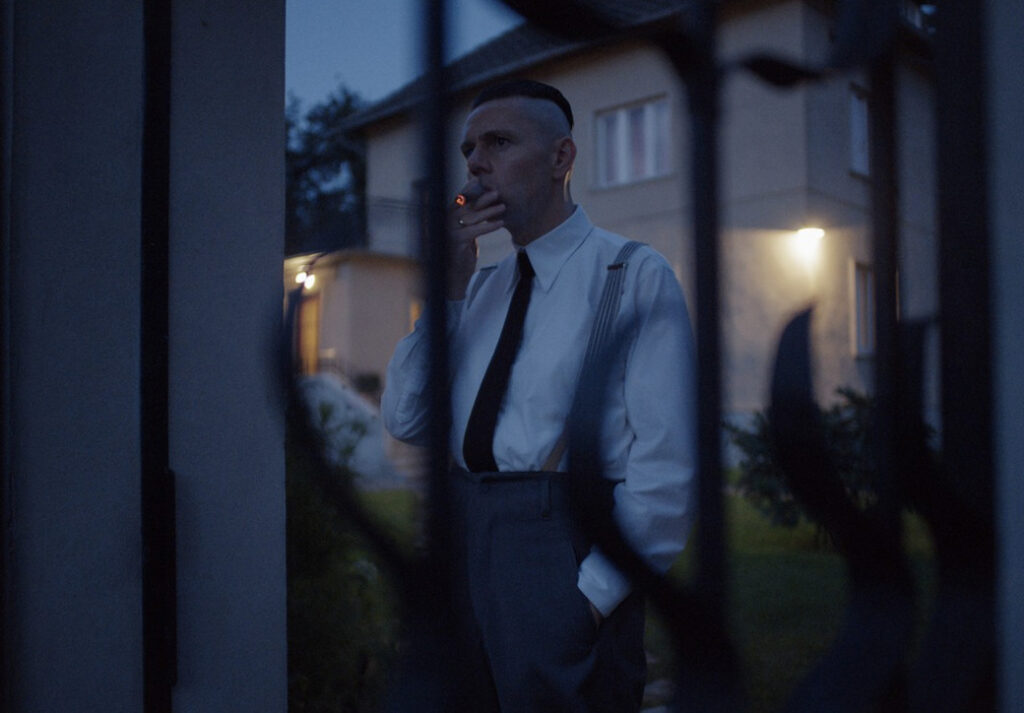
It’s always been important to remember our pasts.
Though we’ve always been told we study the past to prevent the same problems from arising again, that never seems to work. Maybe there is a part of us all that somewhere in the back of our minds when a new film arrives dealing with a historic event that we’ve seen before, we wonder if it is worth it. And while Jonathan Glazer’s new film, The Zone of Interest, lives in the most infamous tragedy of human history…it lives in a very different side of those events and I still am wondering if it is one of the most brilliant things I’ve ever seen.
The chances that you already know what The Zone of Interest is about by the time you read this is very high. But, to express my feelings and thoughts about the film, I am going to somewhat spoil it. This is not the type of film that actually can have what most people consider a spoiler, I need to map out a fair amount of the film. This is your warning now. If you would rather not know certain details about the story before you see it, come back later and continue on.
The Zone of Interest does work best if you’re unaware what you’re in for. As the film opens on Rudolf Höss (Christian Friedel taking on the role of the real life officer) and his family enjoying a beautiful day along the riverside near their home, you’d think you’re just watching the glorious vacation of a large and well off family. Their home is picture perfect. Lovely white picket fence front with lush foliage marking the path to the door. A large sprawling yard, rife with lush, colorful flowers and a swimming hole as children laugh and play around the grounds. They even have a staff that swiftly works around them to keep up appearances.

The only oddity of their lives is the backyard fence. It is a large, cold stone wall topped with barbed wire. On the other side, dilapidated, dirty factory-like buildings. Something you think would be a turn off for a family, even if the rest of their home is a dream. The issue is, Rudolf Höss is the overseer of Auschwitz. The other side of their backyard wall is the concentration camp.
Those workers shuffling by in the background of their home are the imprisoned chosen to run errands instead of being sent to death.
The majority of the film’s 106 minute runtime is just watching the family of the Nazi overseers leading a “normal” life while gunfire and atrocities are a stone’s throw away from their back door. Rudolf’s birthday gathering is held moments after a coffee clutch meeting in his living room to discuss the new ovens they plan to put into the camps.
The billowing smoke of the trains taking people to and from the camp just peek over the top of their garden wall as the family rollick in their time appropriate swimming pool.
There is family drama, too. Rudolf’s wife Hedwig (Sandra Hüller) has her mother visiting for the first time to see the wonderful home they have built for themselves. Hedwig then also has to deal with the news that the Nazi high command is planning to move Rudolf to a position back in Berlin. She does not want to leave the paradise they have been raising their family in, and she is furious. This is a family drama of a Nazi officer who was in charge of the death of millions. And you may wonder…why would someone want to watch that. And this is where the film’s brilliance comes alive, but also comes into question.
Though there are interspersed portions of personifications of classic fairy tales that Rudolf reads to his children to put them to sleep that are actually the other side of life from the Höss’s- as a none imprisoned Jew plants aid for her captured brethren–you are just watching the day to day life of Nazis living their best life, not caring about the life of those they are killing. Until, as Rudolf leaves an important meeting that places him in such a high position, he might as well be the furor’s right hand. He stares off into the darkness and as we also peer into the darkness too, a door opens.
Suddenly, it is modern day and we are watching a group of women nonchalantly cleaning the Holocaust museum at Auschwitz. They wipe down glass, sweep up around the central heating unit that was all the rage when the Höss’s had it installed in the 40s, and vacuum up around the encased piles of shoes taken from the dead before they were sent to be turned to ash. And then it is back to Rudolf as he continues to walk out the grandiose headquarters he so loves and admires.

Though it is based on a novel of the same name by Martin Amis, the stories of the book and film are wildly different. I have never read the book and I cannot speak to what it was trying to say, but I have seen numerous reviews of the film calling it an exploration into the banality of evil. And sure, that is not an incorrect statement to make, but more than anything The Zone of Interest is more of a study of how we have become so overly saturated with a piece of history, that we have become numb to it. The same blaise attitude the Höss’s have toward the other side of their garden wall and the chore it is for others to keep clean a marker of one of the most tragic pieces of humanity’s past is like second nature now.
We are so desensitized to the fact of the world that it has allowed the same mindsets that set it into motion 80 years ago to rise again. Maybe we haven’t reached certain landmark points of depravity yet, but if we are going to just let it all pass on its lower levels like it is normal…then what will happen in the future. The mundane nature of the lives of a family who cares more about themselves than the lives of millions, is pretty much the mindset we have found our culture in. It’s a brilliant allegory when you really think about it.
Then why am I also questioning the brilliance I’ve already shone upon the film? Because the message is loud and clear, did we need 106 minutes to make the point? The Zone of Interest is filled to the brim with gorgeous photography and brilliant framing, but would it have been just as impactful as a short film? It may take a second viewing to get that thought the clarification it needs, but I can’t help but fight about it in my own mind.
Final Grade: A

